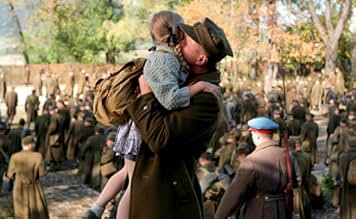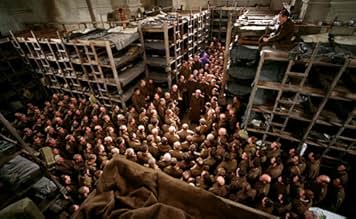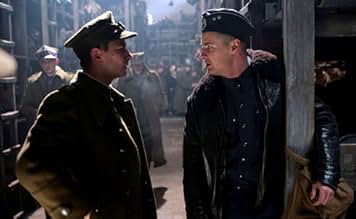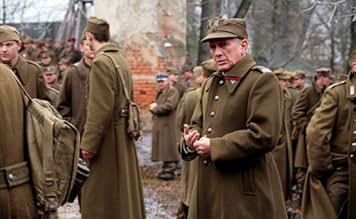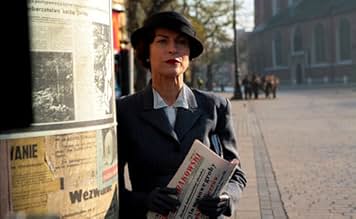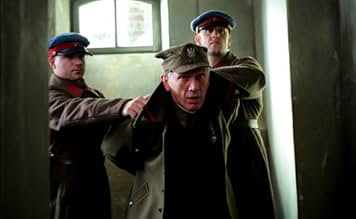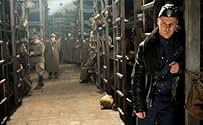IMDb-BEWERTUNG
7,0/10
17.934
IHRE BEWERTUNG
Eine Untersuchung der sowjetischen Schlachtung von Tausenden polnischen Offizieren und Bürgern im Katyn-Wald im Jahr 1940.Eine Untersuchung der sowjetischen Schlachtung von Tausenden polnischen Offizieren und Bürgern im Katyn-Wald im Jahr 1940.Eine Untersuchung der sowjetischen Schlachtung von Tausenden polnischen Offizieren und Bürgern im Katyn-Wald im Jahr 1940.
- Für 1 Oscar nominiert
- 14 Gewinne & 14 Nominierungen insgesamt
Joachim Paul Assböck
- Obersturmbannführer Bruno Müller
- (as Joachim Assböck)
Empfohlene Bewertungen
KATYN is one of the most powerful World War II films I have ever seen and from the first frame of Poles fleeing from the Germans to the rear and the Russians in the front, an audience immediately feels the horror and claustrophobia of attempting to flee from the enemy, but with a sense of absolutely no where to run. The cast is simply superb, the story one of Polish Officers who meet their fate at the hands of the enemy, but with a sense of pride in themselves and their families, and the men and women who struggled to deal with both the Germans and the Russians and survive, is one written in the annals of history, but now with the truth of the slaughter finally brought to light. The final scenes in KATYN sent me from the theater with a sense of wanting to get a deep breath of air in my lungs, and to attempt to digest the horror I had just seen on the screen. KATYN deserves the Oscar and it is a film that will haunt you forever.
An estimated minimum of 3 million Poles were killed by the Stalinist regime; but as Stalin observed "When one person dies it's a tragedy; when a million people die it's a statistic".
The scope of these activities would be considered genocide, if that term was used to describe political and social, as well as racial and religious populations.
So - less "statistically"- mothers, fathers, brothers, sisters, kids, and friends were murdered for the political ends of those who now wish to remain faceless and unknown. It is critical, if we are to emerge as a humane people, that the unknown and faceless multitudes of both victims and their oppressors and killers, be reveled. This movie perhaps, is the first step in that direction.
The scope of these activities would be considered genocide, if that term was used to describe political and social, as well as racial and religious populations.
So - less "statistically"- mothers, fathers, brothers, sisters, kids, and friends were murdered for the political ends of those who now wish to remain faceless and unknown. It is critical, if we are to emerge as a humane people, that the unknown and faceless multitudes of both victims and their oppressors and killers, be reveled. This movie perhaps, is the first step in that direction.
Everyone in Poland has heard of the Katyn massacre but I've been surprised and saddened at how few people in Britain know of the atrocity. In the early part of the Second World War, more than 4,000 Polish soldiers were executed in the Katyn forest near Smolensk in western Russia. This was part of an organised effort to eradicate the military, political and intellectual leadership of Poland and a series of executions in various other locations removed some 22,000 Poles from their loved ones and their nation.
So, who did this? The Germans claimed to have uncovered the bodies in 1943 and blamed the Soviets in an effort to embarrass and divide the Allies. The Soviet Union categorically denied the crime at the time and for decades afterwards, only in 1990 admitting what the Poles and any independent assessor of the evidence knew: Stalin's NKVD perpetrated the horror on his express command.
The incident has now been made into a major Polish film by the acclaimed Polish director Andrzej Wajda whose own father was killed at Katyn and who is now in his 80s. The work was premiered at the Berlin film festival in 2007; it was nominated for the Academy Award for Best Foreign Film in 2008; and it finally arrived in Britain in a few cinemas in the summer of 2009. It is an exceptional work - both powerful and moving - that deserves a much larger audience.
Starting in 1939 with the simultaneous invasion of Poland by the Nazis and the Soviets, it takes us in several jumps to the immediate post-war period and underlines that the shame of Katyn was not just the deaths of the 22,000 in 1940 but the denial of the truth by so many people for so many years afterwards. Through the device of a prolonged flashback, the film concludes with a return to Katyn with close-up scenes of the sheer brutality of what was unquestionably a war crime.
The film is based on a novel by Andrzej Mularczyk and revolves around a number of fictional families with a fair bit of location work in Krakow, a city centre that looks today much like it did in the 1940s and which I have visited. The photography and acting are both excellent and selective use of wartime film footage simply adds to the sense of verisimilitude.
Footnote: To my utter astonishment, at the Renoir cinema in central London where I saw the film, as I descended the stairs to the screen, I was given a leaflet by a representation of something called The Stalin Society which insisted that the massacre was carried out by the Germans in 1943 and that Wajda's film is simply part of a sustained attempt to discredit communism at a time of economic crisis when so many people would see it as the obvious alternative to capitalism.
So, who did this? The Germans claimed to have uncovered the bodies in 1943 and blamed the Soviets in an effort to embarrass and divide the Allies. The Soviet Union categorically denied the crime at the time and for decades afterwards, only in 1990 admitting what the Poles and any independent assessor of the evidence knew: Stalin's NKVD perpetrated the horror on his express command.
The incident has now been made into a major Polish film by the acclaimed Polish director Andrzej Wajda whose own father was killed at Katyn and who is now in his 80s. The work was premiered at the Berlin film festival in 2007; it was nominated for the Academy Award for Best Foreign Film in 2008; and it finally arrived in Britain in a few cinemas in the summer of 2009. It is an exceptional work - both powerful and moving - that deserves a much larger audience.
Starting in 1939 with the simultaneous invasion of Poland by the Nazis and the Soviets, it takes us in several jumps to the immediate post-war period and underlines that the shame of Katyn was not just the deaths of the 22,000 in 1940 but the denial of the truth by so many people for so many years afterwards. Through the device of a prolonged flashback, the film concludes with a return to Katyn with close-up scenes of the sheer brutality of what was unquestionably a war crime.
The film is based on a novel by Andrzej Mularczyk and revolves around a number of fictional families with a fair bit of location work in Krakow, a city centre that looks today much like it did in the 1940s and which I have visited. The photography and acting are both excellent and selective use of wartime film footage simply adds to the sense of verisimilitude.
Footnote: To my utter astonishment, at the Renoir cinema in central London where I saw the film, as I descended the stairs to the screen, I was given a leaflet by a representation of something called The Stalin Society which insisted that the massacre was carried out by the Germans in 1943 and that Wajda's film is simply part of a sustained attempt to discredit communism at a time of economic crisis when so many people would see it as the obvious alternative to capitalism.
Are there words to express suffering, injustice, hypocrisy of war? May empathy ease the pain of those who lost hope for a better world?
There are many movies on WWII that appear to be more or less captivating, touching as well as educational. And, in this respect, we could easily rate this movie in that way if we treat KATYN as yet another film on WWII. However, the case here is different, more to say exceptionally unique.
Andrzej Wajda, after 18 years since the downfall of communist regime, fulfills the duty he feels to his parents and all Polish Patriots and makes a film on the theme that, not long ago, was not only forbidden to discuss in theater or cinema, but in all public places, the Truth that was prohibited and highly unwelcome, the Truth about the slaughter of more than 20,000 Polish best officers committed by Soviet communists in the forests of Katyn. Andrzej Wajda based his film on Andrzej Mularczyk's story POST MORTEM and consulted great Katyn witnesses, including recently deceased Priest Zdzislaw Peszkowski (1918-2007). If the film is good or weak belongs to the opinions of particular viewers. But lots of people on the premiere day stated that it's a historic work. Why?
KATYN, though a movie, is a wonderful documentary that supplies the viewer with TRUTHFUL information on what really happened in 1940, why it happened and who did this (facts that were most distorted in many historical books and many other sources for years). Here, the truth is more important than anything else. The movie contains archive footage, pictures and terrific narrator. These moments are well balanced and, though appearing several times, do not disturb anything but make for all the rest. And what is the rest?
The rest contains particularly vivid plots of families, their dreams, their fear, husbands/sons' honor, wives' love and care, and foremost young officers' martyrdom. The story of Andrzej (Artur Zmijewski) is exceptionally moving. His situation seems to represent the Poland of that time: torn between two oppressors, two worlds: Nazi Germany who attacked it on September, the 1st, 1939 and communist Russia who attacked it from the east 17 days later. As a victim of Katyn massacre, Andrzej appears to tell us a tragic story of separation, extreme suffering, but hope, to the very last day, the hope for survival. His notebook seems to tell us: "No, I will live, they're taking us somewhere but I'll surely see my beloved woman, my loving mum and my sweet daughter." The tragic though full of hope Christmas Eve also depicts that attitude. Other characters, including Jerzy (Andrzej Chyra), Andrzej's wife Anna (Maja Ostaszewska), General's wife (Danuta Stenka) constitute a brilliant insight into various, usually helpless, reactions towards evil, hypocrisy, injustice, cruelty and neutrality.
These stories are executed in an accurate and universal way. In such historic but tragic content, there is usually a tendency to become either too preachy or too emotional, which, to some extend, jerk the tears from viewers' eyes by force. Wajda does not do anything of these. He remains with the people, with humanity in general, does not give the final answer to anything. He seems to be with all of us and appears to depict a quest for truth, quest for justice and for humanity. Besides, he uses lots of very accurate symbols. The unforgettable and probably most thought provoking symbol is when Andrzej's wife looks for her husband and uncovers the bodies of soldiers. Among them, she occurs to uncover the figure of Christ taken from the Cross in church and laid among the deceased. Haven't we killed God by losing respect for life? Another brilliant symbol is when Russian soldiers tear the Polish flag into two parts, hanging the red part again as the Russian flag and using the white part as a foot dressing.
Except for the factors described above, KATYN is also a wonderful piece of work as a film. Very good cinematography, moody atmosphere, flawless performances. Artur Zmijewski does a brilliant job as Andrzej, Maja Ostaszewska is genuine as his wife and heroic, in a sense, Maja Komorowska is again a real artist in her job giving a real portrayal of the caring and then mourning mother. And Andrzej Chyra as Jerzy whose conscience and solidarity do not allow him to go on...magnificent!
But at the end I must tell you that it was not easy for me to write this review. The stories like this one do not lead to wordy comments, much noise, opinions, praise or criticism. They call for silence, the sacred silence that lets us honor those who died in such inhumane way. This silence shall constitute a significant message for today's generation, shall help us see deeper and give us faith to believe that their lives did not end in the soil. Therefore, though difficult, I consider KATYN one of the most important movies I have seen in my life.
Yes, dear young Patriot, hold Your Rosary high. The world will probably call your act "the act of despair". Yet, the world is befriended with lie and you are now victorious in a world of Glory and Eternal Light where there is no room for "lie". R.I.P.
There are many movies on WWII that appear to be more or less captivating, touching as well as educational. And, in this respect, we could easily rate this movie in that way if we treat KATYN as yet another film on WWII. However, the case here is different, more to say exceptionally unique.
Andrzej Wajda, after 18 years since the downfall of communist regime, fulfills the duty he feels to his parents and all Polish Patriots and makes a film on the theme that, not long ago, was not only forbidden to discuss in theater or cinema, but in all public places, the Truth that was prohibited and highly unwelcome, the Truth about the slaughter of more than 20,000 Polish best officers committed by Soviet communists in the forests of Katyn. Andrzej Wajda based his film on Andrzej Mularczyk's story POST MORTEM and consulted great Katyn witnesses, including recently deceased Priest Zdzislaw Peszkowski (1918-2007). If the film is good or weak belongs to the opinions of particular viewers. But lots of people on the premiere day stated that it's a historic work. Why?
KATYN, though a movie, is a wonderful documentary that supplies the viewer with TRUTHFUL information on what really happened in 1940, why it happened and who did this (facts that were most distorted in many historical books and many other sources for years). Here, the truth is more important than anything else. The movie contains archive footage, pictures and terrific narrator. These moments are well balanced and, though appearing several times, do not disturb anything but make for all the rest. And what is the rest?
The rest contains particularly vivid plots of families, their dreams, their fear, husbands/sons' honor, wives' love and care, and foremost young officers' martyrdom. The story of Andrzej (Artur Zmijewski) is exceptionally moving. His situation seems to represent the Poland of that time: torn between two oppressors, two worlds: Nazi Germany who attacked it on September, the 1st, 1939 and communist Russia who attacked it from the east 17 days later. As a victim of Katyn massacre, Andrzej appears to tell us a tragic story of separation, extreme suffering, but hope, to the very last day, the hope for survival. His notebook seems to tell us: "No, I will live, they're taking us somewhere but I'll surely see my beloved woman, my loving mum and my sweet daughter." The tragic though full of hope Christmas Eve also depicts that attitude. Other characters, including Jerzy (Andrzej Chyra), Andrzej's wife Anna (Maja Ostaszewska), General's wife (Danuta Stenka) constitute a brilliant insight into various, usually helpless, reactions towards evil, hypocrisy, injustice, cruelty and neutrality.
These stories are executed in an accurate and universal way. In such historic but tragic content, there is usually a tendency to become either too preachy or too emotional, which, to some extend, jerk the tears from viewers' eyes by force. Wajda does not do anything of these. He remains with the people, with humanity in general, does not give the final answer to anything. He seems to be with all of us and appears to depict a quest for truth, quest for justice and for humanity. Besides, he uses lots of very accurate symbols. The unforgettable and probably most thought provoking symbol is when Andrzej's wife looks for her husband and uncovers the bodies of soldiers. Among them, she occurs to uncover the figure of Christ taken from the Cross in church and laid among the deceased. Haven't we killed God by losing respect for life? Another brilliant symbol is when Russian soldiers tear the Polish flag into two parts, hanging the red part again as the Russian flag and using the white part as a foot dressing.
Except for the factors described above, KATYN is also a wonderful piece of work as a film. Very good cinematography, moody atmosphere, flawless performances. Artur Zmijewski does a brilliant job as Andrzej, Maja Ostaszewska is genuine as his wife and heroic, in a sense, Maja Komorowska is again a real artist in her job giving a real portrayal of the caring and then mourning mother. And Andrzej Chyra as Jerzy whose conscience and solidarity do not allow him to go on...magnificent!
But at the end I must tell you that it was not easy for me to write this review. The stories like this one do not lead to wordy comments, much noise, opinions, praise or criticism. They call for silence, the sacred silence that lets us honor those who died in such inhumane way. This silence shall constitute a significant message for today's generation, shall help us see deeper and give us faith to believe that their lives did not end in the soil. Therefore, though difficult, I consider KATYN one of the most important movies I have seen in my life.
Yes, dear young Patriot, hold Your Rosary high. The world will probably call your act "the act of despair". Yet, the world is befriended with lie and you are now victorious in a world of Glory and Eternal Light where there is no room for "lie". R.I.P.
Katyn by Andrzej Wajda
A courageous film by a director who makes no concessions. Austerity instead of high-tech. What cineast of hallucinatory action, of nude and crude sensuality, of sequences full of monumental catastrophes would make a film in which one had scenes in a slower rhythm, without sex, with shadowy photography, with quiet music and giving ethical principles priority over the characters and their lives.
One more reason, however, for us to thank Hollywood for nominating this film to run for the Oscar for the best foreign film.
The Katyn massacre, perpetrated on Stalin's orders to eliminate the fine flower of the Polish intelligentsia, was left out of official Soviet history until the glasnost of Gorbatchov. There, in the Katyn forest and in other places as well, thousands of Polish officers were massacred. The Soviets tried to attribute it to the Nazis, but the truth eventually came to light. There is still, however, in Russia today, an attempt to deny the historical truth.
I would like to make my own the reading of the film which focuses on this question of the distortion of historical fact by the apparatus of the state. The official lie imposed by the Soviet occupation of Poland brought torment to the lives of many of the families of the victims. Wajda's denunciation, along with the cry "Never kill again!" can also serve as an alert for our present world, in which so often a virtual reality becomes a substitute for the truth.
The first group of interpretations belong to the women (wives, mothers, daughters) of the dead officers: how they coped, first with the hope of their return, and then with the definitive notice of their loss. They are marvellous interpretations, revealing the director's mastery and the talent of the actors. The portrayals demonstrate how, even when nothing else is left, there is still dignity. The wife of the dead General in Katyn refuses to endorse a declaration, prepared by the Nazis, denouncing the Soviets. The truth was known why, then, should she play Hitler's propaganda game? He was just as much the enemy as Stalin was. Another woman wants to honour the memory of her brother by putting on the family tomb a stone with his name on it. Courageously she challenges the regime, but in vain - the stone is destroyed because on it the date of the officer's death indicates clearly who is to blame.
Most of the male characters were simply victims of massacre; among those who had the opportunity of showing themselves authentically noble was a Russian officer who tried to save his Polish neighbour and her daughter. "I couldn't save my own family but I can help yours." And it is a Polish officer who has changed sides who represents, in the middle of so much heroism, the weakness of some. "It is necessary to survive," he declared.
An entire population was suffocated by the Nazi and Soviet occupation. It is a shock to be shown in the film the cordial relations between the officials of the occupying powers, which would have been inconceivable in earlier years. Poland is partitioned (yet again!) by the Molotov-Ribbentrop pact. In the Poland occupied by the Nazis all the professors of a university are summoned and arrested there and then (as a means of impeding the formation of future opposition). In the Poland occupied by the Soviets, the Polish officers are made prisoners of war (an efficient means of stopping them fighting for the independence of their country).
Pawel Edelman's photography is simply a work of genius, a mixture of sombre realism and the surreal. The music of Krzystof Penderecki fits the narrative like a glove, producing just the right atmosphere at the right time. The dry narrative style has something in common with a documentary and calls to mind another of his films, Love in Germany. And there is no lack of the symbolism present in all his films, this time with a remarkably religious tone.
In the development of the story there are moments taken from the films of that period as, for example, the powerful exhumation of the dead, scenes which served Soviets and Nazis alike in placing the blame on each other.
For me the strongest images are those of the young man who refused to declare that his father had not been killed in Katyn by the Soviets; of the two waves of fugitives running in opposite directions and meeting in the middle of a bridge which way to run? of the general who tried to animate his men in the last Christmas of their lives and of the little girl awaiting the return of her father. This last touched me in a special way, because I too had waited for my father's return at the end of the war.
Katyn is, without doubt, one of Andrzej Wajda's greatest films.
Tomasz Lychowski Rio de Janeiro, Brazil February, 2008.
Translated into English by Graham Connell
A courageous film by a director who makes no concessions. Austerity instead of high-tech. What cineast of hallucinatory action, of nude and crude sensuality, of sequences full of monumental catastrophes would make a film in which one had scenes in a slower rhythm, without sex, with shadowy photography, with quiet music and giving ethical principles priority over the characters and their lives.
One more reason, however, for us to thank Hollywood for nominating this film to run for the Oscar for the best foreign film.
The Katyn massacre, perpetrated on Stalin's orders to eliminate the fine flower of the Polish intelligentsia, was left out of official Soviet history until the glasnost of Gorbatchov. There, in the Katyn forest and in other places as well, thousands of Polish officers were massacred. The Soviets tried to attribute it to the Nazis, but the truth eventually came to light. There is still, however, in Russia today, an attempt to deny the historical truth.
I would like to make my own the reading of the film which focuses on this question of the distortion of historical fact by the apparatus of the state. The official lie imposed by the Soviet occupation of Poland brought torment to the lives of many of the families of the victims. Wajda's denunciation, along with the cry "Never kill again!" can also serve as an alert for our present world, in which so often a virtual reality becomes a substitute for the truth.
The first group of interpretations belong to the women (wives, mothers, daughters) of the dead officers: how they coped, first with the hope of their return, and then with the definitive notice of their loss. They are marvellous interpretations, revealing the director's mastery and the talent of the actors. The portrayals demonstrate how, even when nothing else is left, there is still dignity. The wife of the dead General in Katyn refuses to endorse a declaration, prepared by the Nazis, denouncing the Soviets. The truth was known why, then, should she play Hitler's propaganda game? He was just as much the enemy as Stalin was. Another woman wants to honour the memory of her brother by putting on the family tomb a stone with his name on it. Courageously she challenges the regime, but in vain - the stone is destroyed because on it the date of the officer's death indicates clearly who is to blame.
Most of the male characters were simply victims of massacre; among those who had the opportunity of showing themselves authentically noble was a Russian officer who tried to save his Polish neighbour and her daughter. "I couldn't save my own family but I can help yours." And it is a Polish officer who has changed sides who represents, in the middle of so much heroism, the weakness of some. "It is necessary to survive," he declared.
An entire population was suffocated by the Nazi and Soviet occupation. It is a shock to be shown in the film the cordial relations between the officials of the occupying powers, which would have been inconceivable in earlier years. Poland is partitioned (yet again!) by the Molotov-Ribbentrop pact. In the Poland occupied by the Nazis all the professors of a university are summoned and arrested there and then (as a means of impeding the formation of future opposition). In the Poland occupied by the Soviets, the Polish officers are made prisoners of war (an efficient means of stopping them fighting for the independence of their country).
Pawel Edelman's photography is simply a work of genius, a mixture of sombre realism and the surreal. The music of Krzystof Penderecki fits the narrative like a glove, producing just the right atmosphere at the right time. The dry narrative style has something in common with a documentary and calls to mind another of his films, Love in Germany. And there is no lack of the symbolism present in all his films, this time with a remarkably religious tone.
In the development of the story there are moments taken from the films of that period as, for example, the powerful exhumation of the dead, scenes which served Soviets and Nazis alike in placing the blame on each other.
For me the strongest images are those of the young man who refused to declare that his father had not been killed in Katyn by the Soviets; of the two waves of fugitives running in opposite directions and meeting in the middle of a bridge which way to run? of the general who tried to animate his men in the last Christmas of their lives and of the little girl awaiting the return of her father. This last touched me in a special way, because I too had waited for my father's return at the end of the war.
Katyn is, without doubt, one of Andrzej Wajda's greatest films.
Tomasz Lychowski Rio de Janeiro, Brazil February, 2008.
Translated into English by Graham Connell
Wusstest du schon
- WissenswertesThe director's father was killed in this massacre. Andrzej Wajda was only 13 years old then. His father's remains were never found.
- PatzerTur says to Ewa, "Haven't you seen that Disney's "The Sleeping Beauty", remember?" That movie was first released fourteen years after 1945, so this may be a mistranslation in the subtitles for "Snow White".
- VerbindungenFeatured in The 80th Annual Academy Awards (2008)
- SoundtracksPolish Requiem For 4 Solo Voices, Choir And Orchestra
Written by Krzysztof Penderecki
Performed by Polish State Philharmonic Orchestra
Top-Auswahl
Melde dich zum Bewerten an und greife auf die Watchlist für personalisierte Empfehlungen zu.
- How long is Katyn?Powered by Alexa
Details
- Erscheinungsdatum
- Herkunftsland
- Offizieller Standort
- Sprachen
- Auch bekannt als
- Katyn
- Drehorte
- Produktionsfirmen
- Weitere beteiligte Unternehmen bei IMDbPro anzeigen
Box Office
- Budget
- 4.000.000 € (geschätzt)
- Bruttoertrag in den USA und Kanada
- 118.095 $
- Eröffnungswochenende in den USA und in Kanada
- 11.053 $
- 22. Feb. 2009
- Weltweiter Bruttoertrag
- 14.768.451 $
- Laufzeit2 Stunden 2 Minuten
- Farbe
- Sound-Mix
- Seitenverhältnis
- 2.35 : 1
Zu dieser Seite beitragen
Bearbeitung vorschlagen oder fehlenden Inhalt hinzufügen

